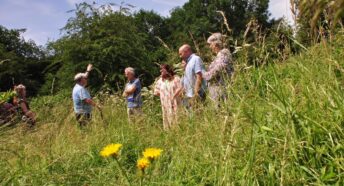The planning system – where power lies and how to make your voice heard
This in-depth feature is in two parts. Part I explains where power lies in the planning system and where and how decisions are made. Part II explores the ways in which, with support from CPRE Bedfordshire, you can make your voice heard.
PART I
National policy
National planning policy is set out by the government in the National Planning Policy Framework (NPPF).
MPs
MPs do not have any formal role in the planning process. Sometimes MPs may (if they wish) help constituents articulate their concerns on a planning application or write to the Local Planning Authority (LPA) about an issue.
How are individual planning decisions made?
Planning applications are decided by a Committee or under delegated powers. Each Local Authority has a Planning Committee which meets regularly to decide on a small number of applications each month. Most applications will be decided under delegated powers, by a Planning Officer. Major applications are normally determined by the Committee, or those with a certain number of objections. Local councillors can also specifically request that an application is decided on by the Committee through the Councillor Call-In process. Dealing with applications under delegated powers helps speed up the process. If an application meets all the criteria for delegation, the case officer will assess the application and prepare a report making a recommendation for refusal or approval.
The formal consultation period for planning applications is a minimum of 21 days (the Local Authority may allow longer) which starts soon after the application has been submitted.
What happens if an application is refused?
Applicants can appeal if they are refused planning permission. They can also appeal if there was no decision within the statutory time limits or if they feel that the planning permission was granted with ‘unreasonable’ conditions. Most appeals are handled by the Planning Inspectorate, which is a government department, and are dealt with via written representations. Sometimes, a planning inspector will opt for a hearing instead of, or as well as, written representations. For more complex cases, they may also opt for a local public inquiry.
What is a judicial review?
The planning decisions of LPAs, planning inspectors and the Secretary of State can be challenged in court under ‘judicial review’. This is not an appeal against a planning decision itself. The focus of judicial review is on whether a planning decision was made in a proper and lawful manner.
There is a strict six-week time limit for applying for judicial review. To proceed, a claim for judicial review requires permission from the court. It will decide whether a claimant has a ‘sufficient’ interest and whether the grounds for judicial review are met.
If the court finds that procedural mistakes were made, it can cancel a planning decision. The LPA, planning inspector or Secretary of State will then retake their decision, correcting any mistakes identified by the court.
Government call-in process
The Secretary of State has the power to direct the local planning authority to refer an application to them for decision. This is known as a ‘called-in’ application. Anyone, including MPs, can request for a planning application to be called-in by the Secretary of State. It is, however, very unusual for an application to be called in unless it is very large or is spread over a number of Local Authorities and has many objections.
Certain types of larger applications have to be referred to the Secretary of State before a Local Authority can finalise their decision. They inform the Secretary of state whether they intend to refuse or approve the application and the Secretary of State then decides whether they wish to call in the application.
Called-in applications are normally then decided through a Public Inquiry and the Secretary of State makes the final decision not the Local Authority.
Nationally Significant Infrastructure Projects
These are large scale projects like power stations, roads and large renewable energy projects. They are treated separately from normal local authority planning because of their size and importance to wider communities. The Planning Inspectorate is the government agency responsible for examining applications of this size and scale. Local examples include the expansion of Luton Airport and East West Rail. These projects include a statutory consultation period.

PART II
How can I make my voice heard?
CPRE Bedfordshire encourages local residents to engage with the local planning process. There are three key ways that you can do this.
Local Plans
Local Plans are a statutory requirement and are prepared by local planning authorities. Local Plans have an economic role (business and infrastructure), a social role (building strong communities) and an environmental role (protection of landscapes, wildlife, heritage and sustainability).
When your Local Authority is consulting on a new Local Plan or revisions to existing Plan we will let you know via our website, e-newsletters and social media. You’ll be able to access the documents provided by the council and have your say on their priorities, suggest sites for development and much more. It’s really important to get involved at this stage because once a site is allocated for development in the Local Plan it’s much more difficult to stop it being built on.
You can find out about your area’s Local Plan by following the links below:
Neighbourhood Development Plans (NDPs)
These are often referred to as Neighbourhood Plans and have been introduced to give communities the opportunity to develop a shared vision for their neighbourhoods. They are usually led by Parish Councils. They must conform with the strategic policies of the Local Plan and cannot prevent the scale of development deemed necessary in the Local Plan. They can have input into areas like the protection and creation of nature reserves and green spaces, renewable energy projects, where houses are built and levels of need for affordable housing.
If your community is consulting on a Neighbourhood Plan then you can have your say on some of these crucial issues by giving your feedback. Once a Neighbourhood Plan has been agreed, a referendum will be held across the neighbourhood area for the registered electors to vote on whether they want the Local Authority to adopt the plan. The plan has to be supported by a simple majority of votes in order for it to be ‘made’ and included as part of the Local Plan.
Individual planning applications
Anyone can object or support a planning application. You can also ask your ward councillor to consider putting in a Call-In request to get the application considered by the full Planning Committee rather than under delegated powers. CPRE Bedfordshire works closely with Local Action groups to help them raise awareness in their local communities and to communicate the key grounds for objecting to a planning application. If an application is refused, we will also help action groups monitor any appeals or revised applications.
If there’s an appeal, any comments that interested parties made on an application during the public consultation stage are passed on to the planning inspector. If a planning inspector decides to hold a hearing or opts for a public inquiry, interested parties can attend. The inspector will decide whether interested parties can speak at the hearing.
You can find your area’s planning portal by following the links below:
Nationally Significant Infrastructure Projects
You can also engage with Nationally Significant Infrastructure Projects. A statement of Community Consultation is written in consultation with the relevant local authorities, which describes how the local community will be consulted about the project. They must carry out statutory consultation in line with what is in this document. This happens at the pre-application stage and is your chance to have your say.








